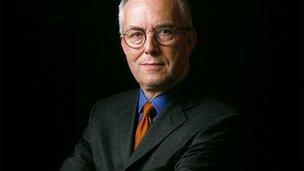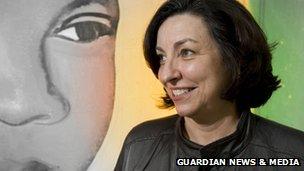Do you have the write stuff to be a novelist?
- Published

Fed up with publishers' rejection slips, many new authors are turning to self-publishing
The book industry is in the middle of an existential crisis as the rise of e-books and the internet threaten overturn its traditional business methods.
The printed book risks going the way of the cuneiform tablet, papyrus scroll or vellum parchment, say the doomsayers.
Yet, the rapid changes in technology are proving a boon to many struggling authors, disappointed by a growing pile of publishers' rejection letters.
Robin Duval, formerly Britain's "chief film censor", or more officially director of the British Board of Film Classification, is one of a growing number of writers turning to self-publishing instead.
"I sent off the first couple of chapters and a synopsis to agents and a couple of publishers, and in effect I got no response at all," he says.
"The problem for me was about after about six or eight rejections, I was beginning to doubt the quality of the book itself."
Unwilling to see his novel languish as an unpublished manuscript, he turned to self-publishing - paying for his book to be published himself - and ordered a print run of 100 copies.
Dramatic growth
Robin says he had no great expectations of sales, but he wanted the finished book to look good, and to be available through Amazon and in other book shops.
"I was expecting to have a box room full of 95 unsold copies, but in fact the book sold far more than I had anticipated."

Like most authors Robin Duval has not got rich from his writing
Bear in the Woods - his first book - has now sold more than 400 print copies and Robin has also published it as an e-book as well.
He is not alone. The number of authors turning to self-publishing has grown dramatically in recent years, says Jeremy Thompson, managing director of Troubador, one of the UK's leading self-publishing houses.
"It's part of the trend of people doing it themselves, and the internet has been a huge catalyst as authors are seeing that they don't need a publisher."
Talent spotting
While in the past the big publishing houses were often rather sniffy about self-published writers, these days, attitudes have changed.
"We're very interested in self-publishing, this is a way we can spot talent," says Victoria Barnsley, chief executive at HarperCollins.

New technologies allow publishers to interact directly with readers, says Victoria Barnsley
"It helps take some of the risk away from us if we can actually see something is already working."
The challenge for new authors, whether with e-books or printed copies, is getting readers interested.
Robin Duval says he wanted a self-publishing house which would not only print his book, but then market it to the book trade - to get it to those making the buying decisions.
"There's no problem getting your book onto the internet, the big problem is getting anybody to pay attention," he says.
Reaching readers
It's where publishing houses like Troubador can help, says Jeremy Thompson.
"It's getting somebody to stock it and sell it, that's where we come in. We can talk to the trade buyers and the sales reps - we can get books into bookshops."
But despite the huge growth in e-books in the past few years, the traditional publishing houses are not yet predicting the end of printed book.
In fact, figures for 2012 show that while e-book sales are still on the rise, the rate of decline in print sales has actually slowed.
At HarperCollins, Victoria Barnsley says while new technologies are a challenge for the big publishing houses, they are also creating opportunities.
"What's changing is that now we've got an opportunity to have a direct relationship with consumers in a way that we never did before.
"Before, all our relationships had to go through retailers, but now we can interact with readers in social media and other forms online.
"For a lot of people, they want to have this nice object. Books aren't like CDs, they're very beautiful things to have and to hold, and people like collecting them and putting them on bookshelves."
'I shall break even'
Robin Duval says writing the book is only half the battle, as self-published authors need to do as much as they can to whip up reader attention.
"I have opened a Twitter account to my own private astonishment, and what I am doing is dealing with various blogs which I am trying to stir up into some kind of interest.
"To generate publicity, you just have to keep hard at it."
Self-publishing is 'a great deal if you can crack it'', says author Robin Duval
His second book, Below the Thunder, comes out in print this month, and he is busy on a third novel.
Like most authors, Robin says he has made relatively little from his writing so far.
"I didn't cover my costs on my first book, though when you allow for the tax relief allowed for self-publishers I shall more or less break even."
Yet, for him there has been one very clear sense of achievement - seeing his name in print on the cover of a book.
"When the very first copy arrived in the post I had exactly the same reaction of any first-time published author - I was astonished at how wonderful it looked."